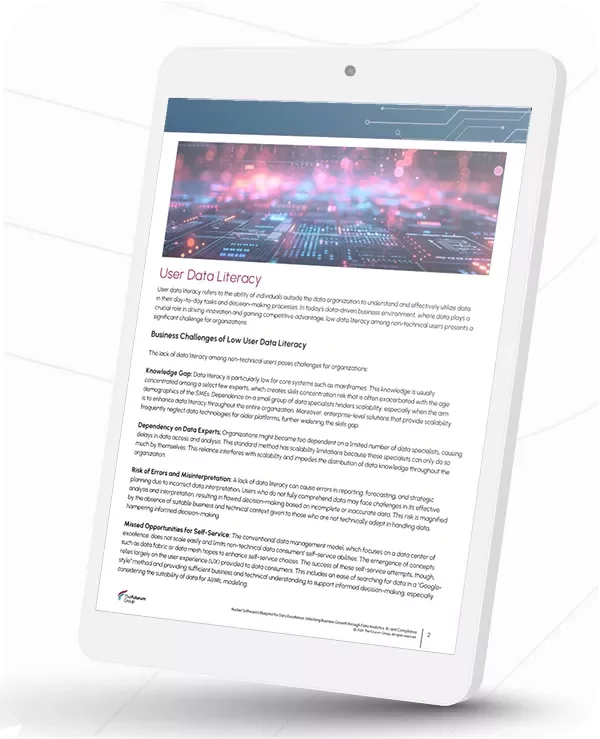Overcoming Core Challenges of Leveraging Mainframe Data in Modern Systems
What if you could enhance your data-driven initiatives with your mainframe, leveraging all its structured and unstructured data to empower your capabilities in predictive analytics, generative AI, and more?
Futurum Groups Vice President and Practice Leader for Hybrid Cloud, Infrastructure, and Operations Steven Dickens discusses strategies for overcoming common challenges faced by Data leaders seeking to unlock the value of data stored on the mainframe in Rocket Software's Blueprint for Data Excellence: Unlocking Business Growth through Data Analytics, AI, and Compliance.
Challenges surrounding data literacy, data integrity, and security and regulation take on new heights when confronted with the skills and technology gaps that often exist within mainframe organizations. Understanding such nuances and adopting an approach that breaks down the barriers between your mainframe teams and the rest of your organization is critical to long-term success.
Read the full brief by the Futurum Group to accelerate your journey towards unlocking mainframe data.
Understanding the core challenges
Low data literacy
Data literacy refers to the ability of individuals outside the data organization to understand and effectively utilize data in their day-to-day tasks and decision-making processes. Organizations face challenges in improving data literacy due to knowledge gaps in core systems, dependence on limited data experts, risk of errors from incorrect data interpretation, and missed opportunities for non-technical user self-service. These issues hinder scalability, slow down data access and analysis, and impede effective decision-making.
Poor data integrity
Data integrity refers to the accuracy, consistency, and reliability of data throughout its lifecycle within an organization. Lack of integrity leads to inaccurate decision-making, trust erosion in data, process inefficiencies, and elevated compliance risks. Such problems can result in missed opportunities, skepticism, operational delays, errors, increased costs, regulatory fines, legal liabilities, and reputational damage.
Complex security and regulatory requirements
Businesses face substantial challenges in security and regulation, including data breaches and cybersecurity threats requiring strong cybersecurity and risk management measures. The complex web of data privacy laws, such as the GDPR, CCPA, and HIPAA, necessitates stringent data protection measures and routine audits. Establishing effective data governance frameworks and managing vendor-related security risks are also major concerns. All these challenges demand a proactive and comprehensive approach to data security and regulatory compliance.
To uncover the full breadth of challenges surrounding data literacy, data integrity, and security and regulation, read the full brief.
Strategies for overcoming challenges
Improve data literacy
To unlock mainframe data value, customers require scalable, enterprise-grade solutions that enhance data literacy and are compatible with legacy data technologies. Moreover, self-service models allow users to independently analyze data. With the right tooling and services, organizations can improve understanding, extend data accessibility, and make informed decisions, unrestricted by outdated infrastructure.
Resolve gaps in data integrity
A comprehensive approach requires coverage over data lineage, process orchestration, data transfer and replication, and continuous data monitoring and validation. Customers need the capability to accurately trace, manage, replicate, and monitor their data, enhancing efficiency and reducing errors. By ensuring data consistency and reliability, customers enjoy more informed decisions, business continuity, regulatory compliance, and greater innovation.
Sustain security and compliance posture
A holistic solution addresses mainframe security and regulatory concerns, risk management, and incident response. Customers should assess offerings that enhance cybersecurity posture and secure sensitive data assets. By applying a blend of encryption, access controls, automated compliance processes, risk assessments, and continuous monitoring, organizations can effectively identify, evaluate, and mitigate security threats.
To unlock business growth through data analytics, AI, and compliance, read the full brief on Rocket Software’s Blueprint for Data Excellence.
Related posts
New Era of Mainframe Modernization with IBM z17
Mainframes are not just alive—they’re thriving.
Welcome to Modernization. Without Disruption.
We meet you wherever you are and tailor our strategies to align with your specific goals and objectives.
Survey on the Importance of Mainframes and COBOL
Let’s dive into the resilience and evolution of mainframes and COBOL with insights from a recently commissioned Vanson Bourne survey.
